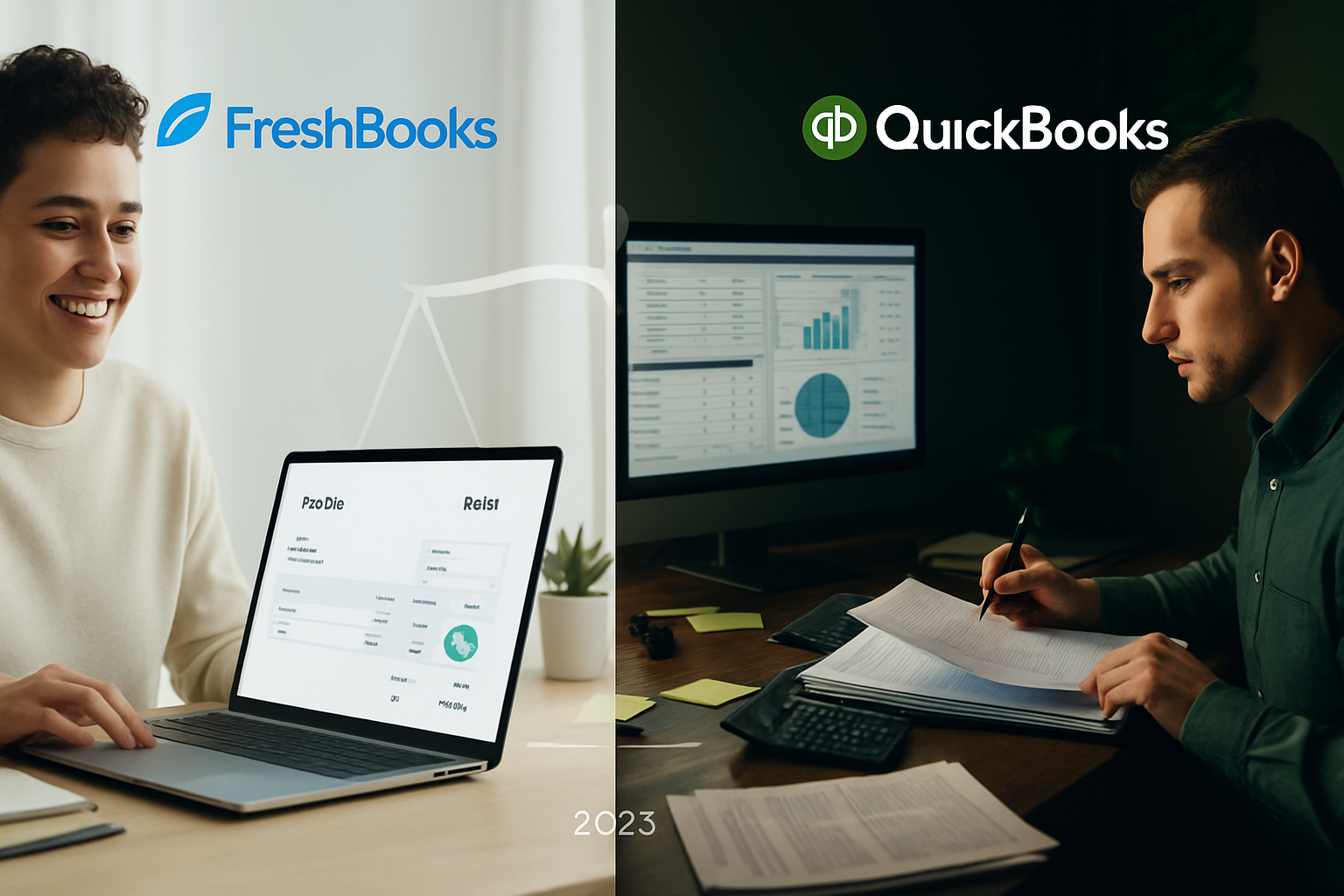· business · 7 min read
QuickBooks Online vs. Competitors: Is It Really Worth the Subscription?
A practical, side-by-side look at QuickBooks Online compared with its main competitors - pricing, features, integrations, security, and hidden costs - plus a decision framework so you can pick the right accounting platform for your small business.

Outcome first: by the end of this article you’ll know whether QuickBooks Online (QBO) is worth the monthly subscription for your business - and which alternative is likely a better fit if it isn’t.
Quick answer up front: for many small businesses that need broad payroll and tax-ready reporting, deep integrations, and a large partner ecosystem, QuickBooks Online is worth the subscription. But for cost-sensitive freelancers, businesses with very simple invoicing needs, or teams that prefer unlimited free users, competing products like Wave, Xero, FreshBooks, or Zoho Books can deliver better value.
Read on for a practical comparison, clear pros and cons, a decision checklist, and real-world recommendations so you can stop debating and start accounting.
Executive summary - the short verdict
- QuickBooks Online - Best for small-to-midsize businesses that expect to scale, need payroll + tax features, or rely on many third-party integrations. Strong ecosystem. Reliable, but not the cheapest.
- Xero - Best for businesses that want similar power to QBO but prefer unlimited users by default and a clean UI. Great for accountants.
- FreshBooks - Best for freelancers and service businesses focused on time tracking, simple invoicing, and client payments.
- Wave - Best free option for solo entrepreneurs and microbusinesses that need core bookkeeping without frills.
- Zoho Books - Best for businesses that already use Zoho apps and want tight app-suite integration at a lower price point.
Which should you pick? If you rely on an accountant and expect to add employees, QBO or Xero. If you’re solo and price matters, Wave or FreshBooks. If you live inside the Zoho ecosystem, Zoho Books.
What matters most in accounting software
Decide which of the following you actually need. Rank them when choosing.
- Core bookkeeping (bank rules, reconciliation, invoicing)
- Payroll and tax filing
- Inventory and cost-of-goods tracking
- Project/time tracking and billing
- Integrations (bank feeds, payment processors, CRM, e-commerce)
- Multi-user access and accountant collaboration
- Reporting and tax-ready exports
- Price, free tier, and total cost of ownership (TCO)
Now let’s see how QBO stacks up against competitors using these lenses.
QuickBooks Online - strengths and weaknesses
Pros:
- Deep feature set across bookkeeping, invoicing, payroll (paid add-on or included in higher tiers), and robust financial reporting.
- Massive ecosystem of apps and certified accountants. If an integration exists, it probably integrates with QBO.
- Widely accepted by bookkeepers and CPAs - easier to hand off books at tax time.
- Frequent updates and responsive product roadmap.
Cons:
- Monthly subscription can be expensive once you add payroll and many apps.
- User permissions can be confusing across plans. Additional seats often cost more.
- Occasional UI complexity - many features, more menus.
Official product page: https://quickbooks.intuit.com/online/
Competitor snapshots
Xero
- Strengths - Unlimited users on most plans, strong bank reconciliation, accountant-friendly tools. Clean UI.
- Weaknesses - Payroll is country-limited (available in some regions only), app ecosystem large but different from QBO.
- Official site: https://www.xero.com/
FreshBooks
- Strengths - Excellent for time tracking, client invoicing, and simple project billing. Very friendly UI for freelancers.
- Weaknesses - Not as strong for inventory or complex accounting. Pricing grows with client/invoice counts.
- Official site: https://www.freshbooks.com/
Wave
- Strengths - Free core accounting and invoicing; paid options for payments and payroll. Great for solo entrepreneurs.
- Weaknesses - Limited advanced features and integrations. Support is more limited for free users.
- Official site: https://www.waveapps.com/
Zoho Books
- Strengths - Affordable, especially if you already use Zoho CRM or Zoho One. Strong automation and workflows.
- Weaknesses - Less market penetration with accountants compared to QBO/Xero.
- Official site: https://www.zoho.com/books/
Sage Business Cloud Accounting
- Strengths - Solid for established small businesses and those who prefer legacy vendor support.
- Weaknesses - UX and integrations can lag behind newer competitors.
- Official site: https://www.sage.com/
QuickBooks Desktop (for context)
- Strengths - Powerful local processing, industry-specific editions, one-time licensing options (or subscription with desktop hosting).
- Weaknesses - No cloud-first access by default; harder to collaborate remotely without hosting.
- Official site: https://quickbooks.intuit.com/desktop/
Pricing snapshot and TCO considerations
Pricing changes often. Always verify current prices on vendor sites. Typical cost drivers beyond the headline subscription:
- Payroll add-on fees.
- Payment processing fees for credit cards and ACH.
- Additional users or accountant access costs (QBO limits in lower plans; Xero generally allows more users).
- App subscriptions for inventory, CRM, e-commerce, or specialized reports.
- Migration costs and professional setup (bookkeeper/CPA time).
Example comparison (illustrative; check live pricing):
- QuickBooks Online - $30–$200+/mo depending on plan and add-ons.
- Xero - $13–$70+/mo depending on plan.
- FreshBooks - $15–$50+/mo.
- Wave - Free core features; payroll & payments priced separately.
- Zoho Books - $15–$40+/mo.
Total cost of ownership (TCO) = subscription + payments + payroll + apps + human support + migration. A cheaper monthly subscription can be more expensive after adding a critical paid integration or service.
Integrations and ecosystem - where QBO shines
If your business uses a payment processor, e-commerce platform (Shopify, WooCommerce), CRM (Salesforce), or industry apps (POS, contractor management), check integration availability and depth.
QBO often has first-class integrations and many pre-built connectors. This lowers integration and data-mapping costs. Xero and Zoho also have wide marketplaces. Wave and FreshBooks are more limited.
Security and compliance
All major SaaS accounting vendors use strong encryption, secure data centers, and compliance controls. Still, verify:
- Two-factor authentication availability
- Data export and backup options
- Regional data residency if required for compliance
- Audit trails and permission controls
Links to vendor security pages: QuickBooks (https://quickbooks.intuit.com/learn-support/en-us/help-article/security/secure-your-account/00/877709), Xero (https://www.xero.com/us/security/), Zoho (https://www.zoho.com/books/help/security/).
Migration and switching costs
Switching platforms is doable, but it costs time and money. Typical steps and pain points:
- Exporting chart of accounts, customers, vendors, historical transactions.
- Reconciliations post-migration.
- Reconnecting bank feeds and reauthorizing integrations.
- Rebuilding automation, invoices, templates, and payroll settings.
Tips to reduce pain:
- Run the new system in parallel for 1–2 months.
- Engage an accountant or migration specialist to map historical data.
- Use vendor migration tools when available (many vendors offer free or paid migration support).
Who should choose each product - quick recommendations
Choose QuickBooks Online if:
- You expect to hire employees and need payroll and tax features.
- You rely on a wide range of third-party integrations and an accountant familiar with QBO.
- You want an industry-standard product with lots of online help and a partner network.
Choose Xero if:
- You want unlimited users and a modern UI optimized for accountants.
- Payroll availability in your country meets your needs.
Choose FreshBooks if:
- You’re a freelancer, consultant, or service-based business focused on time tracking and client billing.
Choose Wave if:
- You are a solo entrepreneur or microbusiness and need the lowest ongoing cost.
Choose Zoho Books if:
- You’re already using Zoho apps and want a lower-cost, integrated suite experience.
Decision checklist - practical questions to ask
- Do I need payroll and tax filing inside the accounting software?
- How many users (team and accountant) need access now and in one year?
- Do I require inventory or advanced project accounting?
- Which payments and e-commerce platforms must integrate seamlessly?
- What is my realistic monthly budget including add-ons?
- Can I run the new system in parallel during a transition month?
Answering these cuts through marketing and focuses you on features you will actually use.
How to test without committing
- Sign up for free trials across your top 2–3 candidates.
- Import a small dataset (last month) and perform reconciliation tasks.
- Try exporting reports and handing them to your accountant for feedback.
- Test payment acceptance and invoice workflows with a real invoice.
- Time basic workflows (create invoice, reconcile a bank statement, run payroll preview).
Cost calculation example (simple)
Suppose you’re a 3-person business:
- QBO Essentials - $60/mo
- Payroll - $45/mo base + $6/employee = $63/mo
- Payment processing - 2.9% + $0.30 per card transaction
- Preferred app - $15/mo
Monthly subtotal: $138 + processing fees → $1,656/year + processing. Add one-time migration $500–$2,000 depending on complexity.
Compare that to Wave with a free accounting base and payroll at market rates - Wave may be $200–$800/year if payroll volumes are low.
Final verdict - is QBO worth the subscription?
Short: Yes - if the subscription pays for what your business actually uses. QBO is a robust, well-supported platform that reduces accounting friction for growing small businesses. The subscription becomes clearly worth it when you factor time saved, fewer reconciliation headaches, and smoother accountant collaboration.
But not always. If your needs are narrowly invoicing, basic bookkeeping, or you are price-sensitive and the business is small, cheaper or free competitors may be a smarter choice.
Choose based on needs, not brand.
If you walk away with one action: map your top 5 accounting needs (e.g., payroll, multi-user, e-commerce integration) and pick the platform that meets at least four well. That will save you money and a migration headache later.
Strong finish: the subscription is only worth it if it replaces time, errors, or opportunity cost. If QBO does that for you, the monthly fee is an investment - not an expense.



